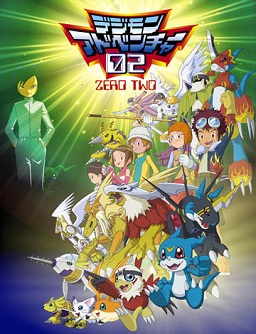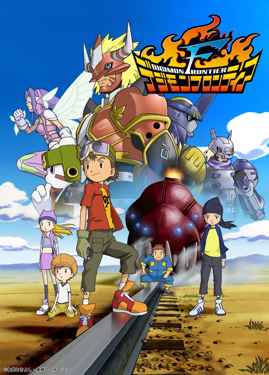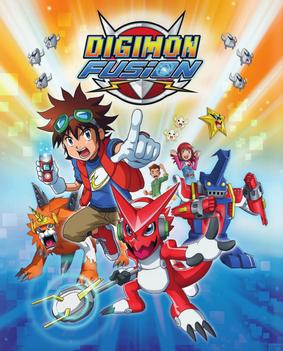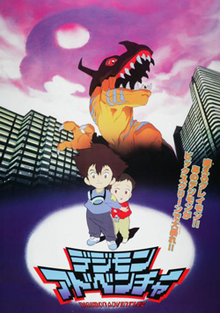Digimon, short for "Digital Monsters", is a Japanese media franchise, which encompasses virtual pet toys, anime, manga, video games, films, and a trading card game. The franchise focuses on the eponymous creatures that inhabit a "Digital World", which is a parallel universe that originated from Earth's various communication networks.

Agumon (アグモン) is a fictional character from the Japanese multimedia franchise Digimon. It is a reptile-like Digimon who has appeared in various parts of the Digimon franchise including anime, manga, toys, video games, trading card games, and other media.

Digimon Adventure, also known as Digimon: Digital Monsters Season 1 in English-speaking territories, is a 1999 Japanese anime television series produced by Toei Animation in cooperation with WiZ, Bandai and Fuji Television. It is the first anime series in the Digimon media franchise, based on the Digital Monster virtual pet released in 1997.

Digimon Tamers is a Japanese anime television series and the third television series in the Digimon franchise, produced by Toei Animation. The series takes place in a new setting separate from the preceding series, Digimon Adventure and Digimon Adventure 02, where the characters utilize cards from the collectible card games. The series aired in Japan from April 2001 to March 2002.

Digimon Adventure 02, marketed as season 2 of Digimon: Digital Monsters in English-speaking territories, is a Japanese anime television series produced by Toei Animation. It is the sequel to Digimon Adventure, and the second anime series in the Digimon franchise. The series aired in Japan from April 2000 to March 2001. It was originally licensed in North America by Saban Entertainment and aired in the US from August 2000 to May 2001.

Digimon Frontier is the fourth anime television series in the Digimon franchise, produced by Toei Animation. Unlike the previous series, the main characters can merge with ancient spirits known as the "Legendary Warriors" to become Digimon themselves.

Digimon: The Movie is a 2000 animated film produced by Saban Entertainment and distributed by 20th Century Fox as part of the Digimon franchise. The film used footage from the short films Digimon Adventure (1999), Digimon Adventure: Our War Game! (2000), and Digimon Adventure 02: Hurricane Touchdown!! (2000), while the events of the film take place during Digimon Adventure (1999–2000) and Digimon Adventure 02 (2000–01).

Digimon Adventure: Our War Game!, also known as Digimon Adventure: Children's War Game!, is a 2000 Japanese anime short film directed by Mamoru Hosoda and produced by Toei Animation. A part of the Digimon media franchise, Our War Game is a sequel to the 1999–2000 anime television series Digimon Adventure and is the second Digimon film overall. The film premiered in Japan on March 4, 2000 as part of the Toei Anime Fair ; in North America, portions of Our War Game were included in the 2000 film Digimon: The Movie. Hosoda has cited Our War Game! as a major influence on his 2009 film Summer Wars, with critics noting numerous similarities between the films. The events of the film take place during the first season of Digimon Adventure.

Digimon Fusion, known in Japan as Digimon Xros Wars, is the sixth anime television series in the Digimon franchise, produced by Toei Animation. The series was broadcast on TV Asahi between July 2010 and March 2012.

Taichi "Tai" Kamiya, known as Taichi Yagami in Japan, is a fictional character in the multimedia franchise Digimon. He first appeared in the Digimon Adventure V-Tamer 01 manga, where he is sent to the Digital World to meet his Digimon companion Zeromaru, in order to save it from multiple enemies. An alternate version of Tai appears in Toei Company's 1999 series as the main protagonist of Digimon Adventure, a supporting character in Digimon Adventure 02 and once again as the protagonist of the films Digimon Adventure tri. and Digimon Adventure: Last Evolution Kizuna. In this timeline, Tai is the leader of the first season DigiDestined. He is adventurous and a born leader, and is usually the first to spring into action. He is partnered with the dinosaur-like Agumon in the Digimon Adventure anime series.

Digimon Adventure tri. is a Japanese adventure anime film series produced by Toei Animation. Celebrating the 15th anniversary of the Digimon franchise, the six-part series serves as a direct sequel to the first two television series, Digimon Adventure and Digimon Adventure 02 and follows the high school years of the first eight "Digi-Destined".

Digimon Adventure: Last Evolution – Kizuna is a 2020 Japanese animated adventure film directed by Tomohisa Taguchi and written by Akatsuki Yamatoya based on the Digimon franchise by Akiyoshi Hongo. Produced by Toei Animation with animation by Yumeta Company and distributed by Toei, Last Evolution – Kizuna is set in the same continuity of the first two Digimon television anime series, and serve as a series finale of the original Digimon Adventure story. Last Evolution – Kizuna was released in Japan on February 21, 2020.

Digimon Adventure is a Japanese anime television series. It is the eighth anime series in the Digimon franchise and a reboot of the 1999–2000 anime television series of the same name that follows the adventures of children in the world of Digimon, struggling to prevent a series of disasters spreading into real world.













